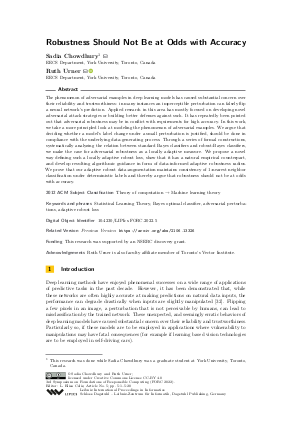@InProceedings{chowdhury_et_al:LIPIcs.FORC.2022.5,
author = {Chowdhury, Sadia and Urner, Ruth},
title = {{Robustness Should Not Be at Odds with Accuracy}},
booktitle = {3rd Symposium on Foundations of Responsible Computing (FORC 2022)},
pages = {5:1--5:20},
series = {Leibniz International Proceedings in Informatics (LIPIcs)},
ISBN = {978-3-95977-226-6},
ISSN = {1868-8969},
year = {2022},
volume = {218},
editor = {Celis, L. Elisa},
publisher = {Schloss Dagstuhl -- Leibniz-Zentrum f{\"u}r Informatik},
address = {Dagstuhl, Germany},
URL = {https://drops.dagstuhl.de/entities/document/10.4230/LIPIcs.FORC.2022.5},
URN = {urn:nbn:de:0030-drops-165280},
doi = {10.4230/LIPIcs.FORC.2022.5},
annote = {Keywords: Statistical Learning Theory, Bayes optimal classifier, adversarial perturbations, adaptive robust loss}
}

 Creative Commons Attribution 4.0 International license
Creative Commons Attribution 4.0 International license
































